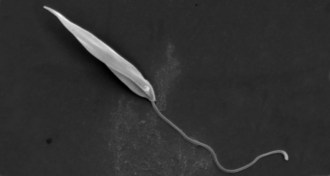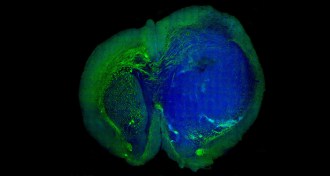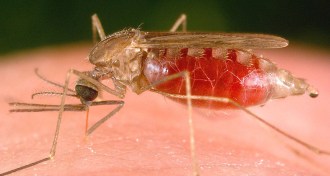Nathan Seppa
Biomedical Writer (retired September 2015)

Trustworthy journalism comes at a price.
Scientists and journalists share a core belief in questioning, observing and verifying to reach the truth. Science News reports on crucial research and discovery across science disciplines. We need your financial support to make it happen – every contribution makes a difference.
All Stories by Nathan Seppa
-
 Health & Medicine
Health & MedicineVaccine stops deadly sand-fly-spread scourge in animal test
A DNA vaccine triggers protection against the sand-fly-borne scourge Leishmania.
-
 Health & Medicine
Health & MedicineFructose may be key to weight gain
Mice that could not make or metabolize the sugar gained less weight than normal mice.
-
 Health & Medicine
Health & MedicineDevice offers promise of no brain tumor left behind
A new technique might allow surgeons to identify with precision where brain cancer ends and healthy tissue begins.
-
 Health & Medicine
Health & MedicineHeart disease patients more apt to take one combined pill than many
Patients stayed on track better with a "polypill" than with three medications.
-
 Health & Medicine
Health & MedicineTest could warn of problems for kidney transplant recipients
A urine test for an immune protein might tell doctors whether a patient is headed for trouble.
-
 Health & Medicine
Health & MedicineClues emerge to explain allergic asthma
Tests in mice reveal that allergens can trigger inflammation by cleaving a clotting protein.
-
 Science & Society
Science & SocietyImpactful Distraction
Talking while driving poses dangers that people seem unable to see.
-
 Health & Medicine
Health & MedicineVaccine protects against malaria in early test
A series of shots enables volunteers to fend off a live infection by the disease-causing parasite.
-
 Health & Medicine
Health & MedicineHigh blood glucose levels linked to dementia
Elderly people with elevated blood glucose levels are more apt to develop dementia, whether or not they have diabetes.
-
 Health & Medicine
Health & MedicineWhat and when babies first eat may affect diabetes risk
Children at risk of type 1 diabetes are better off waiting until 4 months of age to consume solid foods.
-
 Health & Medicine
Health & MedicinePeople may have evolved to fight cholera
People in Bangladesh have genetic variations that might defend against the disease.
-
 Health & Medicine
Health & MedicineExperimental type 1 diabetes treatment shows promise
Findings in a small group of patients hint that a DNA-based therapy might work, but the effects fade after treatment stops.